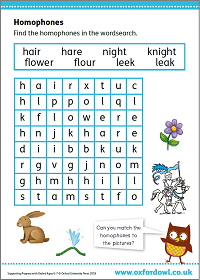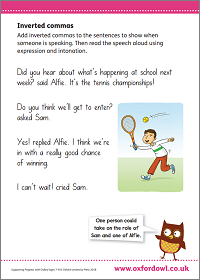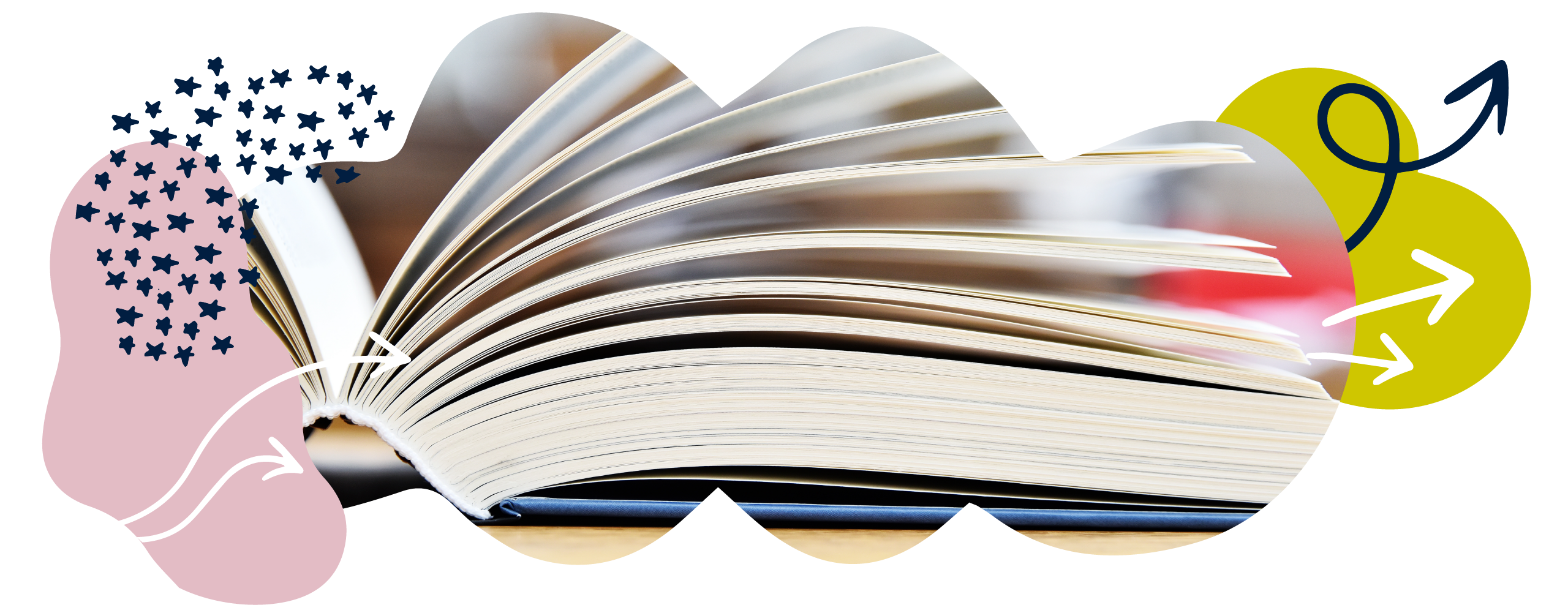Grammar and literacy glossary: D to I
Need a refresher on fronted adverbials or the passive voice? Get to know what your child is learning at school with our guide to common terms and phrases used in schools.
For help with general educational terms, take a look at the Education glossary.
For help with maths terms, take a look at the Maths glossary.
A | B | C | D | E | F | G | H | I | J | K | L | M | N | O | P | Q | R | S | T | U | V | W | X | Y | Z
Decoding
To read a word by saying the sounds then joining, or blending, those sounds together to form the word.
Determiner
A determiner goes in front of a noun and its adjectives to help to tell you which person or thing the sentence is about, or how much or how many of them there are.
The little green bird pecked one juicy apple and ate it as he sat on a branch.
Digraph
A digraph is a sound made up of two letters together such as ‘ch’ or ‘ee’ or ‘ll’. See our phonics made easy page for more information about learning to read with phonics.
Direct speech
When people’s exact words are written down in inverted commas, this is called direct speech.
“I’m beginning to understand,” he said.
Dyslexia
A specific learning difficulty which mainly affects the development of literacy and language-related skills. For further information, visit www.bdadyslexia.org.uk.
Ellipsis
When one or more words are missed out because it is obvious what is meant.
We’re off to the park. I can post your letter. [‘On the way to the park’ has been left out.]
Ellipsis also refers to three dots meaning that a word has been missed out or a sentence has not been finished – for instance, to suggest tension.
The door handle turned, a cough was heard, and…
Exception words
In some English words, the spelling of the word doesn’t appear to fit with the phonemes that children have been taught so far. These words are taught as whole words rather than as a combination of sounds.
Common exception words include the, go, said, my, he.
Common exception words are also sometimes known as ‘red words’ or ‘tricky words‘.
Exclamation
An exclamation is something you say or shout that shows you are very happy, angry, or surprised. In writing you use an exclamation mark after an exclamation.
Oh dear!
Exclamation mark !
An exclamation mark comes at the end of an exclamation. It shows that something is being exclaimed, or said with a lot of feeling.
I’m so late! Hurrah! It’s a goal! No!
An exclamation mark can also come at the end of a command.
No! Run! Stop it!
Fred Talk
To say the individual sounds that make up a word in the Read Write Inc. Phonics reading programme. Elsewhere sometimes called Robot Talk or Sound Talk.
Fronted adverbials
Fronted adverbials are adverbials placed at the beginning of a sentence. There is usually a comma after a fronted adverbial. Watch our short animation for more information.
Video: What are fronted adverbials?
Learn how and when to use adverbials for time, place, manner or number.
Full stop .
A full stop comes at the end of a sentence. It shows that a sentence is complete and finished.
It is a full sentence. I am the tallest in my class.
Future
There are several different ways to talk about the future in English:
The verb ‘will’ followed by the infinitive of the verb.
I will leave next week.
The verb ‘will’ followed by ‘be’ and the present participle.
I will be leaving next week.
The present progressive of the verb ‘go’ followed by ‘to’ and the verb.
I am going to leave next week.
The present progressive of the verb.
I am leaving next week.
The present tense of the verb.
I leave next week.
Group reading
Similar to guided reading, but children take it in turns to read aloud from the same book whilst the teacher listens and supports.
Guided reading
About six children, grouped by reading ability, read aloud from the same book at the same time whilst the teacher listens in and draws out teaching points. At junior levels children may read a book, or part of it, away from the session and then focus on particular aspects of understanding in the session.
High frequency words
These are the words that occur most commonly in the English language. Some are decodable, like ‘much’, whilst others are tricky, like ‘the’.
Video: What are homographs?
Learn about homographs. Perfect to help with spelling homework and to prepare for the Key Stage 2 SATs test.
Activity: Homophones

Find the homophones in the wordsearch.
Video: What are homophones?
Learn about homophones, words that sound the same but have different spellings and meanings.
Hyphen –
Used to join two or more words that should be read as a single unit. A hyphen is shorter than a dash.
Great–aunt; fair–haired.
A hyphen is also used to help avoid ambiguity.
A man eating fish; a man–eating fish.
A hyphen is sometimes used between a prefix and a root word, especially if the hyphen makes the word easier to read.
Co–own; re–educate.
Inverted commas “ ”
Inverted commas, or speech marks, show when people are actually speaking.
“I’m beginning to understand,” he said.
The punctuation at the end of the spoken words always comes inside the final set of inverted commas.
“I can’t hold on any longer!” Alex cried.
You may see single (‘ ’) or double (“ ”) inverted commas, depending on what you are reading. It is important to use the same style across work for consistency.
Activity: Inverted commas

Add inverted commas to the sentences to show when someone is speaking.
